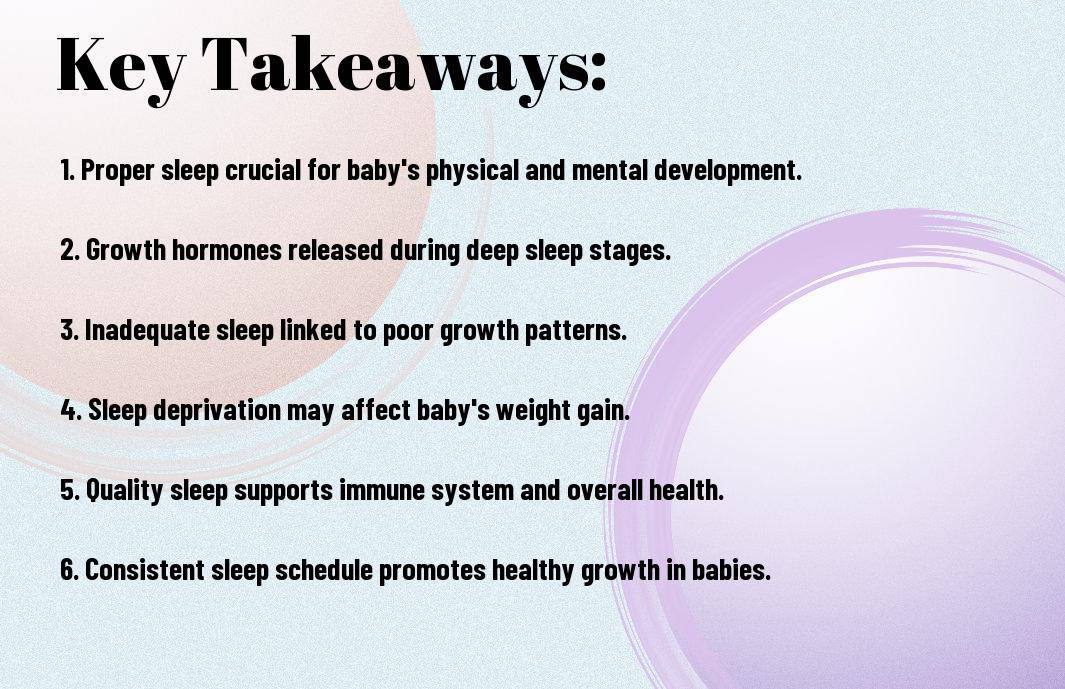tips, tricks and guides for parenthood
Understanding the correlation between sleep and growth is crucial for parents seeking to ensure the healthy development of their babies. Sleep plays a vital role in a baby's growth and overall well-being, impacting everything from physical growth to cognitive development. In this blog post, we will explore the importance of quality sleep for babies, how it affects their growth, and provide tips for establishing healthy sleep habits to support optimal growth and development.

Physical growth milestones in babies mark important stages in their development, from the first smile to the first steps. These milestones include weight gain, height increase, and head circumference measurements. Each baby follows their unique growth curve, influenced by genetics, nutrition, and overall health.
Hormones play a crucial role in regulating the growth process in babies. Growth hormone, produced by the pituitary gland, stimulates growth and cell reproduction. Insulin-like growth factors (IGFs) work together with growth hormone to promote growth in bones and tissues. Thyroid hormones also play a key role in regulating metabolism and growth.
Infants go through various sleep cycles that include both rapid eye movement (REM) and non-REM sleep. These cycles help in the development of their brains and bodies. Understanding these sleep cycles can provide insights into how much rest your baby needs for optimal growth.
Factors such as age, feeding habits, environment, and routine play a crucial role in influencing a baby's sleep patterns. Creating a conducive sleep environment, following a consistent bedtime routine, and ensuring the baby is well-fed can positively impact their sleep quality.
Assume that these factors are interlinked and can collectively contribute to better sleep quality for your little one. By addressing these influencers, you can establish healthy sleep habits for your baby from an early age.
Sleep plays a crucial role in a baby's physical development. Adequate sleep is important for the release of growth hormones, which are vital for cell regeneration and overall growth. Research has shown that babies who get sufficient sleep tend to have healthier growth patterns, including weight gain, muscle development, and overall physical well-being. For more information on how sleep impacts a baby's growth, you can refer to How Sleep Impacts a Baby's Growth.
Current research on the correlation between sleep and baby's growth is shedding light on the importance of quality rest for infants. Studies have shown that adequate sleep not only influences physical growth but also cognitive development and emotional well-being in babies. Researchers are exploring how sleep patterns affect various aspects of growth to provide a holistic understanding of the relationship between sleep and a baby's overall development.
Establishing healthy sleep habits is crucial for your baby's growth and development. Creating a consistent bedtime routine, ensuring a comfortable sleep environment, and setting regular nap times can help regulate your baby's sleep patterns. Limiting screen time and creating a calming atmosphere before bedtime can also aid in promoting better sleep quality.
Addressing sleep challenges is vital to ensure your baby gets the restful sleep they need for optimal growth. Common challenges such as night waking, difficulty falling asleep, and short naps can disrupt your baby's sleep routine. Identifying the root cause of these challenges, whether it be hunger, discomfort, or overstimulation, is the first step in finding a solution to improve your baby's sleep patterns.
Seeking advice from healthcare professionals or sleep consultants can provide you with expert guidance on how to address these challenges effectively, allowing your baby to get the recommended amount of sleep needed for healthy growth and development.
Research has shown a significant correlation between sleep and growth in babies. Ensuring that infants get adequate and quality sleep is crucial for their overall development and growth. Lack of sleep can lead to hormonal imbalances that affect growth hormones, impacting a child's physical and cognitive development. It is important for parents and caregivers to establish healthy sleep routines and create a conducive sleep environment to support optimal growth in babies. By understanding the importance of sleep in a baby's growth, we can empower parents to prioritise healthy sleep habits from an early age.
A: Sleep is crucial for a baby's growth as during sleep, the body releases growth hormones that stimulate growth and development.
A: Newborns need about 14-17 hours of sleep a day, while older babies typically need 12-15 hours of sleep per day for optimal growth.
A: Yes, chronic sleep deprivation can disrupt the release of growth hormones, potentially stunting a baby's growth and development.
A: Establishing a consistent bedtime routine, creating a calming sleep environment, and responding promptly to their baby's sleep cues can help ensure they get enough sleep for growth.
A: Signs such as crankiness, difficulty waking up, frequent night waking, and poor weight gain can indicate that a baby is not getting enough sleep for optimal growth.